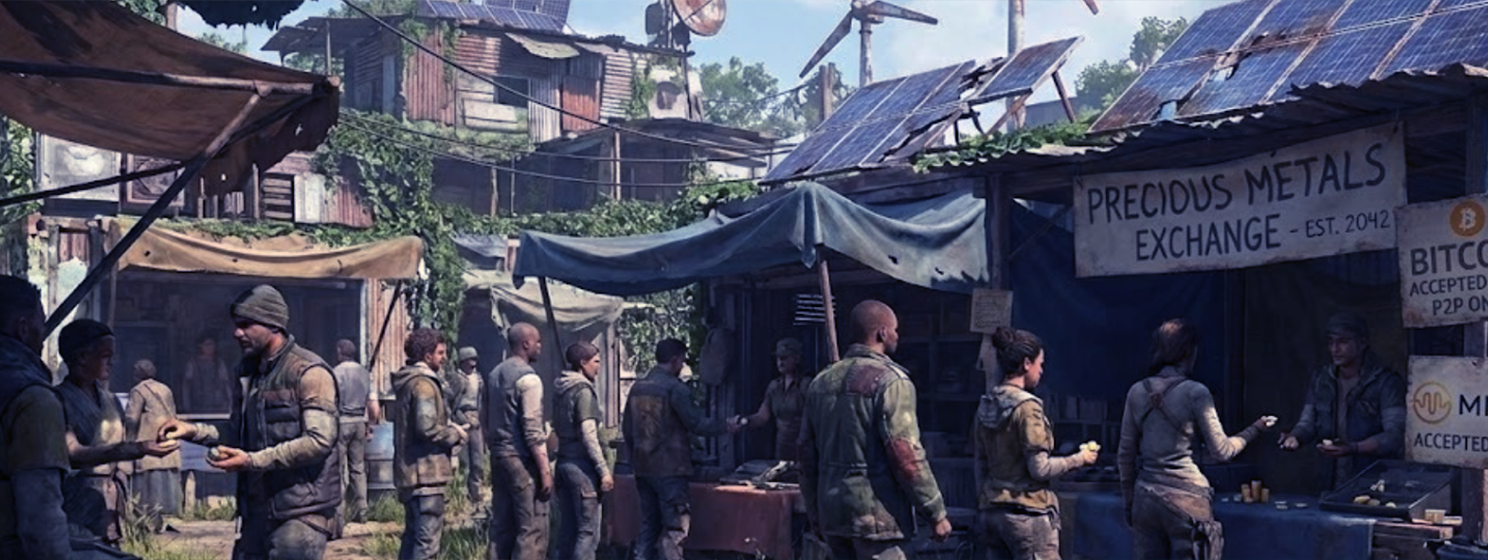|
Getting your Trinity Audio player ready...
|
Think back to 2009-10
An anecdote on a new electronic cash system.
Fun! At the surface, it seems simple. New coins every 10 minutes, and all you have to do is solve the hash first. 50 bitcoins on your laptop! Wait, what’s a difficulty adjustment? Hmmmm. Ok, must get more competitive here. FPGA or GPU should put you to the front of the pack. That worked!
Hmmm, difficulty waaaaaay up again… You’ll never find another block again. What if you pool your resources and split the take? Back in business! Looks like there’s anonymous characters selling Bitcoin ASICS. Seems risky, but that would explain the big move up in difficulty. Let’s try to buy and hope we don’t get scammed.
This was one of the first cultural changes in Bitcoin that started to create factions. The need to cooperate as groups rather than being able to run a full node on existing hardware at home caused a major divide in the business vs “home compute” culture that existed in the Bitcoin community. In many ways, the divide still exists today among small blockers, which is funny because this was Satoshi Nakamoto’s “libertarian” worldview of competitive governance vs Hal Finney’s altruistic view. Many of those who focused on the opportunity to compete and grow have become titans of industry today, while the small blocker maximalists have remained “tyrannical” about owning small hardware and “validating” everyone’s transactions in an altruistic attempt to govern Bitcoin by social consensus.
Skip a decade to see what we have learned
It’s 2021. Bitcoin has split into four SHA256 chain tips out of consensus. BTC remains at odds with tension between home noders vs commercial hashers. BCH and XEC have similar tensions with lead developers obsessed with tinkering and the challenge of keeping things very, very small.
Then there’s BSV with a protocol set in stone and all consensus limits removed; replaced with node settings to be determined purely by competitive consensus among nodes—an experiment in pure capitalism. Notably, BSV continues to set usage and block size records on a monthly basis. Funny how capitalism works, huh?
There is still a social element to the BSV’s in-network competition, but there is a different ethos entirely. With the protocol wars complete (and BSV handily ahead of the pack), the competition has moved up to business application and service level competition. This is most evident across social media where figureheads from enterprise-focused businesses spar with figureheads from nimble startups. As I see it, this started with debates over the scalability of fully indexing software solutions from Unwriter. His solutions were/are elegant and useful, but their existence was seemingly altruistic. He was running multiple instances of SV node and connecting his various tools to them and offering API endpoints to developers so they could build consumer-grade applications for business. This made for fantastic development experiences, but came with the uncertainty of the model’s ability to scale.
His tooling also begged the question of when and how Unwriter would profit which raised questions about how he could continue to upgrade, update and offer competitive services in the long term.
Opinions about this model led to some toxic debates, but also raised some valid concerns about persistence. There are similar questions about competitive offerings like Vaionex Metashard, nChain’s Kensei and MatterCloud’s suite of infrastructure. While some have a profit model, other’s struggle to define their businesses in the marketplace, leading to the necessity to consider some hard truths.
Stop crying and make a real company.
— Calvin Ayre (@CalvinAyre) September 28, 2021
Maybe that is the real lesson of the last decade!
Compete or cooperate?
Is BSV an economy, ecosystem or community? Well, it’s all of them actually. There are fans of the project. The “community” is interested in big block theory and economics of a network without limits. These are the people who cheer for block size records or cool new apps. Then there’s the economy. These are the businesses who build apps that can only exist on bitcoin. They have real skin in the game and cheer for bitcoin’s wins, but also for the wins in their own companies.
Then, there’s the ecosystem. This includes every cooperative edge of the network and has the most diversity: exchanges, miners, opportunists, media… Everyone!
Frankly, there are a lot of things we still don’t “know” when it comes to Bitcoin. How much data should be on chain? When will stuff start being pruned? How many nodes will there be on the network in 50 years? Can we really mine a terabyte block? I have always answered these questions with something like “the market will decide,” or an anecdote about how capitalism solves everything. But that’s unfair. The fact is that I don’t know! And neither does anyone else.
When Gordon Moore, co-founder of Intel, penned “Moore’s Law,” he didn’t know that prices would halve and processing power would double every two years, just like Satoshi didn’t know that bitcoin “never really hits a scale ceiling.” But both men made economic predictions based on what they knew about human behavior in competitive environments, and their predictions have ended up being true, at least as far as we can test them out.
The reason things have played out in their favor is that good ideas typically breed, and bad ideas are orphaned. This is why it’s important for healthy economic competition to bicker a little bit. Not every developer, entrepreneur or business model is good just because it’s on BSV. In fact, it’s been a little disappointing to discover how many of my heroes may have actually been worthless. But this is balanced out by the people who I wrote off or maybe even overlooked who have ended up being incredibly valuable assets to the economy. Maybe it doesn’t matter because of the friendships that we created along the way…
There is some value to that too—even in an economic sense, but the real point is that we should be looking for people to cooperate with so that we can compete better with the economy at large. Nobody should be colluding to build a better nChain, Twetch or TAAL Distributed Information Technologies Inc. (CSE:TAAL | FWB:9SQ1 | OTC: TAALF). We should be competing to disrupt enterprise data, social media as a whole and the entire data processing sector; all with the power that BSV gives us!
OK, focus!
What makes every participant in the network valuable is their ability to compete while cooperating. Is a miner good or bad because they are big? No. Is an app good or bad just because it’s on BSV? No. What will make them “good” in an economic sense will be determined by the watchful eye of history. History will judge whether or not we were geniuses or completely insane, and that’s okay.
If we can set aside our egos and look for the best ways to cooperate while competing, we really truly can disrupt the entire global economy. But it will take a lot of work and a lot of humility. If there’s a piece of advice hidden somewhere, it’s that you shouldn’t plant a seed that you don’t intend to water. And if you’re going to water them, be ready to tend the garden for a good while, but also realize it might not be us that gets to harvest the fruit. But that doesn’t make our work an act of futility. Our children and grandchildren may have an incredibly bountiful harvest because of the work we have done in Bitcoin.
I don’t know. I probably should have wrapped this up at “Stop crying and make a real company.”

 12-17-2025
12-17-2025 





